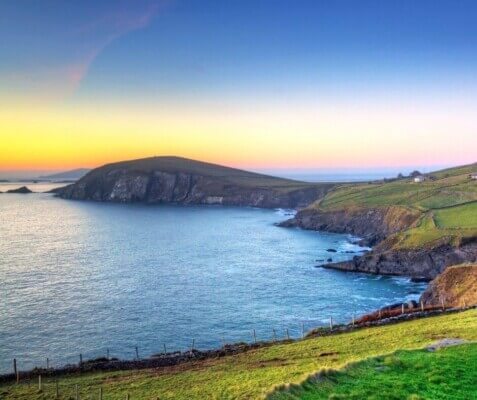Twenty-one years ago on Feb. 2, 2000, a bronze, life-size statue of Fungie, the fun-loving Dingle dolphin was unveiled in a special millennium ceremony. Since October of 2020, the bottlenose dolphin has been missing and exploring the Dingle Peninsula just doesn’t feel the same without him.
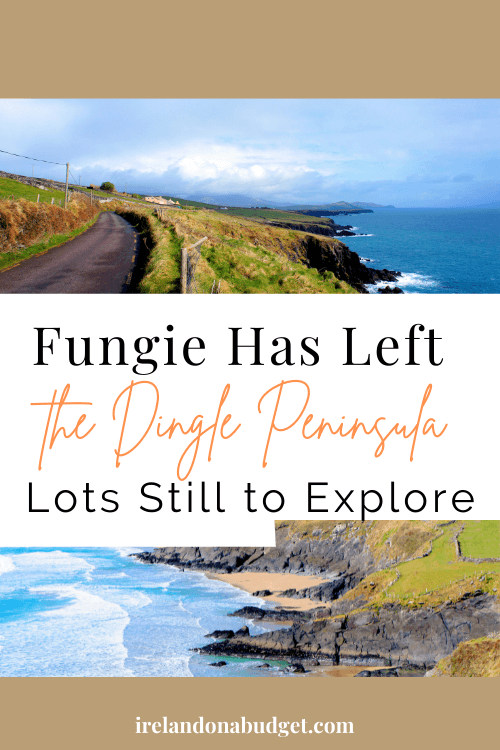 This post and page contain affiliate links and I may earn compensation when you click on the links at no additional cost to you.
This post and page contain affiliate links and I may earn compensation when you click on the links at no additional cost to you.
Fungie, estimated to have been about 40 years old, showed up in the Dingle Harbor in 1983 and was known for his friendly demeanor.
It wasn't long before he was both a local and national celebrity.
Despite the devastating loss of this tourism attraction, there is still a lot to see in this westernmost part of Ireland that has drawn visitors for decades.
Here are some of the more popular spots on the Dingle Peninsula and perhaps some that you may not have heard about before, too.
They include prehistoric ring forts, ancient beehive huts, early Christian chapels, fabulous beaches, and picturesque mountain views.
If you’re exploring the Dingle Peninsula by car, give yourself the entire day to explore the region properly. Believe me, you’ll want to stop often just to take in the fabulous views.
Slea Head Drive
The Slea Head Drive is probably one of the best ways to experience the Dingle Peninsula.
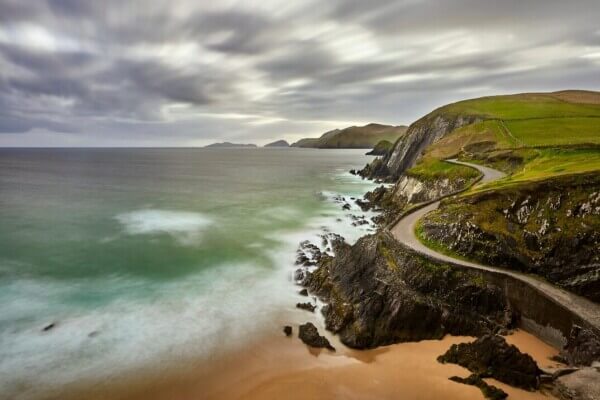
Located on its western end, Slea Head juts out into the Atlantic Ocean, part of a jagged coastline that will give you excellent views of the Blasket Islands, with Skellig Michael in the distance.
This ring road drive begins and ends in Dingle, a lively town with plenty of pubs and restaurants.
For many years, tourists were able to take boat tours from Dingle Harbor to encounter Fungie.
While the friendly dolphin is no longer in the waters near the Co. Kerry town, you can still take a tour with Dingle Dolphin Boat Tours.
On land, there's plenty to see.
The Blasket Centre
The Blasket Centre is located at the tip of the peninsula in Dunquin.
It honors the unique community that lived on the remote islands known as the Blaskets, retelling the story of island life and how its people were evacuated in 1953.
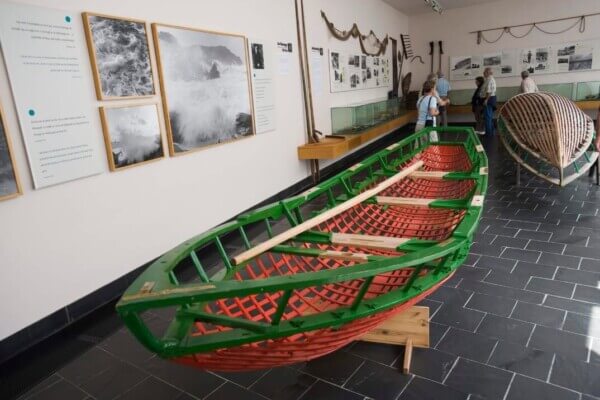
Some of the images on display include the old post office, which was built in the 1900s and was the contact point between the island and the mainland; the National School, which was located in the center of the village and also served as a church during the summer months, and Peig Sayers’ House, perhaps the island’s most famous person, among other old photos.
Dunmore Head
This magnificent headland offers spectacular scenery. It’s no surprise that scenes for the Star Wars movie, “The Last Jedi” were made here.
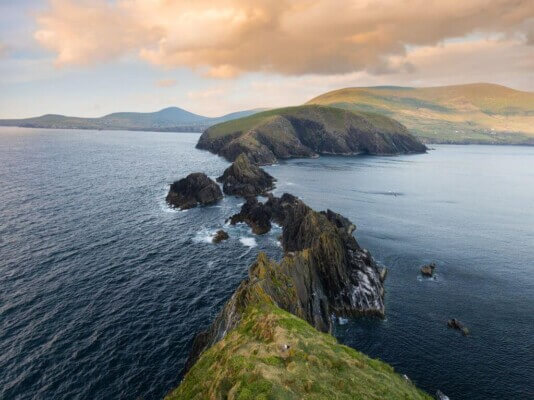
If you have time, take a hike and soak in the beautiful coastline at the same time.
At the highest point of your trek, you’ll find an Ogham stone (pronounced “oh-am”), which contains a primitive alphabet, some as old as the 4th century AD.
This is also the spot where the Spanish Armada ships, the Santa Maria de la Rosa, and the San Juan went down in 1588.
Be sure to walk the strand at the nearby Coumeenole Beach, one of Kerry's most dramatic beaches.
Fahan Beehive Huts
The Fahan Beehive Huts are believed to be the oldest in Ireland.
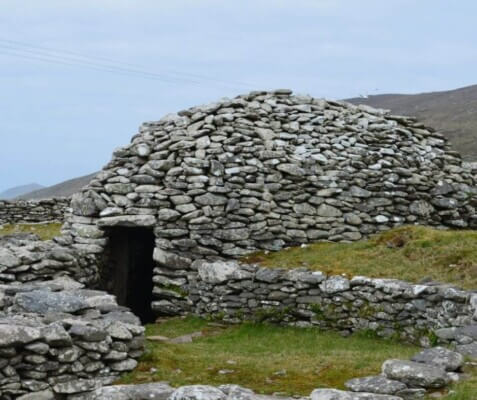
No mortar was used in their construction, which dates from around the 8th century.
Instead, stones were stacked one on top of the other, and as the builders continued to position each layer further inward, a pointed roof emerged.
You can also see the same kinds of beehives in other parts of Kerry, including Skellig Michael.
Full-Day Ring of Kerry Tour from Killarney
Dunbeg Fort
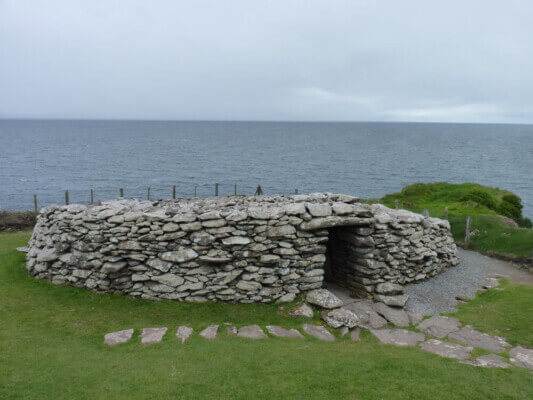
This Iron Age fort, despite much of it being lost to cliff erosion, is definitely worth a visit.
Located on a rocky promontory overlooking Dingle Bay, you can explore the remains of the fort and the beehive huts nearby.
Find out more at the visitor center that also houses a café and restaurant.
Eask Tower
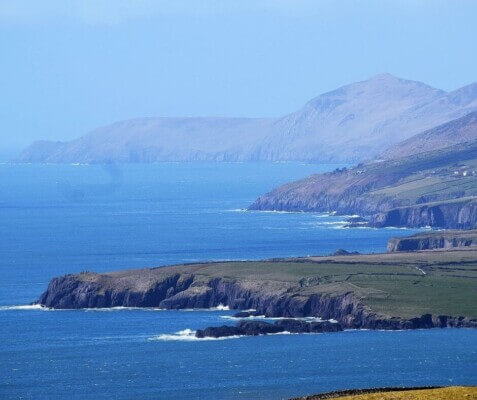
The views from this World War II lookout post are amazing and worth visiting.
In fact, you’ll see much of the Dingle Peninsula, the Blasket Islands, Slea Head, Ventry, the Skellig Rocks, and more from this vantage point.
Rising 600 feet (182 meters) above sea level, the tower was built in 1847 by workers participating in a Famine project.
Slea Head Famine Cottage & Sheepdog Trials
This Famine-era cottage was once the home of the Long and Kavanagh families.
Today, it serves as a reminder of the harshness of life in this region during the 1800s, where the Great Hunger forced many people to emigrate if they did not die beforehand.
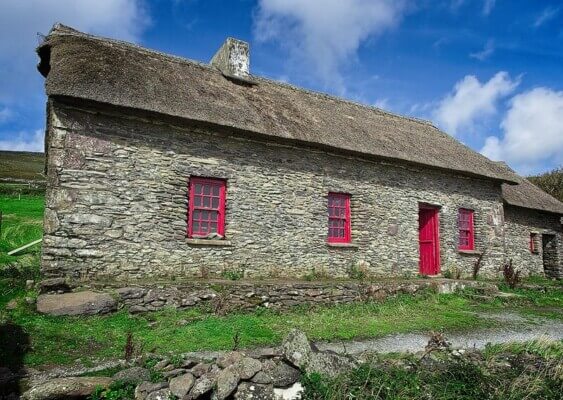
Made out of mud and stone, the cottage still retains its original layout.
It consists of two rooms and a loft, which was accessed by a ladder.
The house originally had a thatched roof, but the landlord, the Earl of Cork, changed the roof to a slate one, believed to be the earliest slated cottage of its kind in the region.
Enjoy a sheepdog trial demonstration when you visit the cottage, a skill that has been handed down in the area for generations.
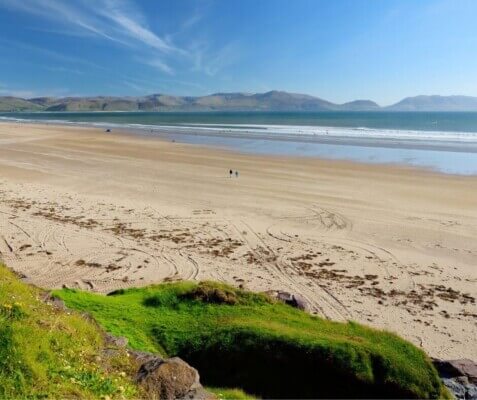
There are several beautiful beaches in this region. They include Inch beach, the filming location for the 1970s epic drama, “Ryan’s Daughter.”
There’s a surf school located nearby that operates during the summer season, from May through September. One-hour classes cost €25, with blocks of five costing €100 payable in advance.
Other water-based activities to enjoy on Inch Beach include kayaking, kite surfing, windsurfing, and hang gliding, to name a few.
Dingle’s Attraction as a Foodie Destination
The Dingle Peninsula also has a solid culinary reputation, its most popular event is the Dingle Food Festival, which happens each year in October.
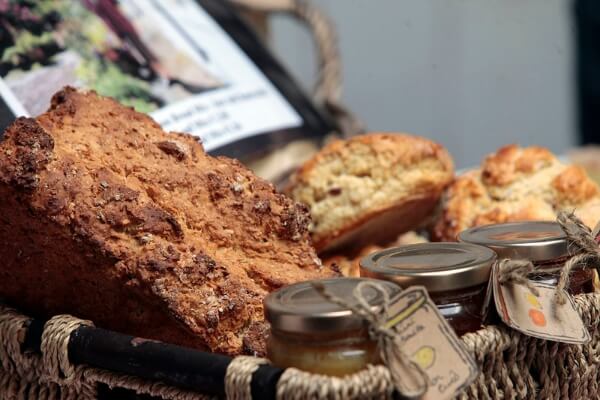
In Dingle alone, there are at least three dozen restaurants, a host of pubs selling craft beers and whiskeys, a culinary school, and a distillery.
Some of the popular restaurants on the taste trail include James Long’s Bar & Restaurant, the Land to Sea Restaurant, Lord Baker’s, Fenton’s of Dingle, and many more.
Have you visited the Dingle Peninsula? Let me know in the comments if you did.

